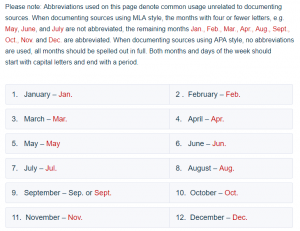Abbreviations of Months of the Year, Days of the Week, and Other Abbreviations of Time
CONTENTS
Month Abbreviaton

m’th
m-th
mo. (plural mos.).
MM and M are usually used in date formats like MM/DD/YY. In some documents it is common to see just “m”.
Please note: Abbreviations used on this page denote common usage unrelated to documenting sources. When documenting sources using MLA style, the months with four or fewer letters, e.g. May, June, and July are not abbreviated, the remaining months Jan., Feb., Mar., Apr., Aug., Sept., Oct., Nov. and Dec. are abbreviated. When documenting sources using APA style, no abbreviations are used, all months should be spelled out in full. Both months and days of the week should start with capital letters and end with a period.
| 1. January – Jan. | 2. February – Feb. |
| 3. March – Mar. | 4. April – Apr. |
| 5. May – May | 6. June – Jun. |
| 7. July – Jul. | 8. August – Aug. |
| 9. September – Sep. or Sept. | 10. October – Oct. |
| 11. November – Nov. | 12. December – Dec. |
See also:
- Abbreviations of the Names of the Months from Yale University Library.
Seasons of the Year (Typically in North America)
| spring – March, April, May |
| summer – June, July, August |
| autumn or fall – September, October, November |
| winter – December, January, February |
After the long-delayed writing of your college assignment sometimes you may need some extra help. Have a brief look at a short list of writing services, that are always ready to help.
See also:
- The Seasons on Earth from Department of Astronomy, Cornell University, Ithaca, NY.
- Earth’s Seasons. Seasons are the result of the tilt of the Earth’s axis, from Enchanted Learning.
Abbreviations of Days of the Week
| 1. Sunday – Sun. | 2. Monday – Mon. |
| 3. Tuesday – Tu., Tue., or Tues. | 4. Wednesday – Wed. |
| 5. Thursday – Th., Thu., Thur., or Thurs. | 6. Friday – Fri. |
| 7. Saturday – Sat. |
See also:
- Symbols for Days of the Week – Historical symbols for the days of the week, by D. Glenn Arthur, Jr., Baltimore, MD.
- Day of the Week – Find out what day of the week did a certain date fall on, by Stephen C. Phillips, University of Southampton, UK.
- Books of the Bible Abbreviations – Helpful hints.
Other Abbreviations of Time
| second – sec. | minute – min. |
| hour – hr. (sometimes h.) | week – wk. |
| ante meridiem (before noon) – a.m. | post meridiem (after noon) – p.m. |
| midnight – 12:00 a.m. | noon – 12:00 p.m. |
| month – mo. | year – yr. |
| century – cent. | before Christ – BC or B.C. (e.g. 30 BC) |
| anno Domini (in the year of our Lord) after birth of Christ – AD or A.D. (e.g. AD 2005) |
|
| before common era – BCE or B.C.E. (same as BC) (e.g. 30 BCE) | common era – CE or C.E. (Christian Era, same as AD) (e.g. 2005 CE) |
You may write A.M. and P.M. using all capital letters or all lower case letters. However, a style you have chosen must be followed consistently throughout the entire document. You should not confuse the two styles.
Sources:
- “Common Abbreviations.” The New Lexicon Webster’s Encyclopedic Dictionary of the English Language. Canadian ed. New York: Lexicon, 1988, CA1-8.
(Above reference out of print. Closest match currently available: Webster’s Encyclopedic Unabridged Dictionary of the English Language, 1996 ed.) - Gibaldi, Joseph. MLA Handbook for Writers of Research Papers. 6th ed. New York: MLA, 2003, 263.
- Useful content concerning Common Abbreviations.




